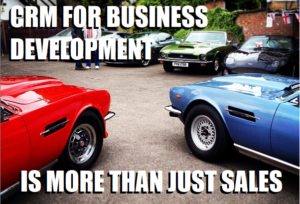The meaning of “Selling” has changed quite a bit over the last 10 years or so. If you tried to personify the word back in the ’00s, you’d probably think of a pushy car salesman who didn’t care about whether he had a car that was right for you, but was very keen to offer you something – anything, that he might be able to sell to you. Nowadays, this is very different. So much so, that we use the term “business development” rather than “sales” because we are worried about scaring off potential customers due to the bad reputation of sales people of old. It’s no longer about what products we have that we can sell to customers, but rather, understanding the challenges our customers face and how we can help them. The relationship comes first, not the revenue.
Relationships first
Since the relationship comes first in an effective client/supplier scenario, the best suppliers put a significant amount of effort into developing and maintaining that relationship. In order to do this, they need to understand the customer extremely well. They must understand how they operate, who their customers are, how they differentiate themselves from their competitors, the processes their customers go through when buying from them, how their industry operates, and much more. It is only after spending the time to learn these things that a supplier can hope to become the ‘trusted advisor’ for a client.
So if the ultimate goal is to become a trusted advisor to your clients, you need to develop the relationship; or to use the more common phrase, Customer Relationship Management. In our 100+ man years of experience, a common misconception we’ve come across is that a CRM software system will automatically develop effective customer relationships for you, without you needing to put any work in. Fun fact: this isn’t the case.
How do you achieve effective CRM?
Effective Customer Relationship Management has two prongs: the first and most important of which is your culture and strategy; you must be willing to invest the time into understanding your customers, to change the way you work to better help your customers, and you must be willing to think outside of the box for your customers. Only once the customer is at the heart of your business should you use the second prong, which is the software. The software is merely a framework to help you identify the current state of your customer relationships quickly and accurately, and provide insight into why they are the way they are and how you can improve. It’s up to you as the business to do something with this information.
Who uses CRM?
With regards to the first of the two prongs – the customer-centric culture and strategy – you also need to consider the people behind this prong. The relationships you have with your customers are not simple – they are complex and multi-faceted. Due to this level of complexity, people in your organisation who have professional relationships with your customers should be the people using CRM software. Let me say that again more concisely because it’s important. Anyone in your business who interacts with a customer should use CRM software.
Why? Because in order for you, as a business, to be able to create a virtuous circle of strengthening the relationship, identifying customer challenges and solving those challenges, you must invest energy into the areas we talked about – and the only way to do that is by consolidating, considering and acting on all of the knowledge you have about your customers.
Let’s consider a specific example: while on the phone during a support call, your employee, Jeff, identifies that Karen, a customer, lacks knowledge on importing records. Jeff, having been coached in good CRM culture, knows that this information is important and creates an activity for your Business Development rep, Michael, to see if he can help the customer solve a problem they didn’t know they had – which was poor knowledge of an area of a system. Michael follows up with Karen and offers a one-to-one online training session, which helps Karen immensely as it saves her hours of struggling with the software. So not only did Jeff identify a sales opportunity (the training session) – he also helped build and strengthen the relationship with the customer, Karen, who now feels like she’s being helped to get the most out of the system.
We’re all part of a CRM culture
In reality, many organisations have people like Jeff on their team – people who play a vital role in maintaining the virtuous circle of strengthening customer relationships, identifying customer challenges and solving those challenges. But Jeff simply sighs and rolls his eyes behind the protection of his headset and monotonously continues with his day, without realising that he is actually part of that CRM culture.
So you can start to see why it’s not just your sales team who should use CRM for business development. By leveraging both CRM culture and CRM software together to bring all the information together, you can become more effective in using the two prongs of CRM for business development. But remember: this only works if all of your internal touch points with the customer are on board!





